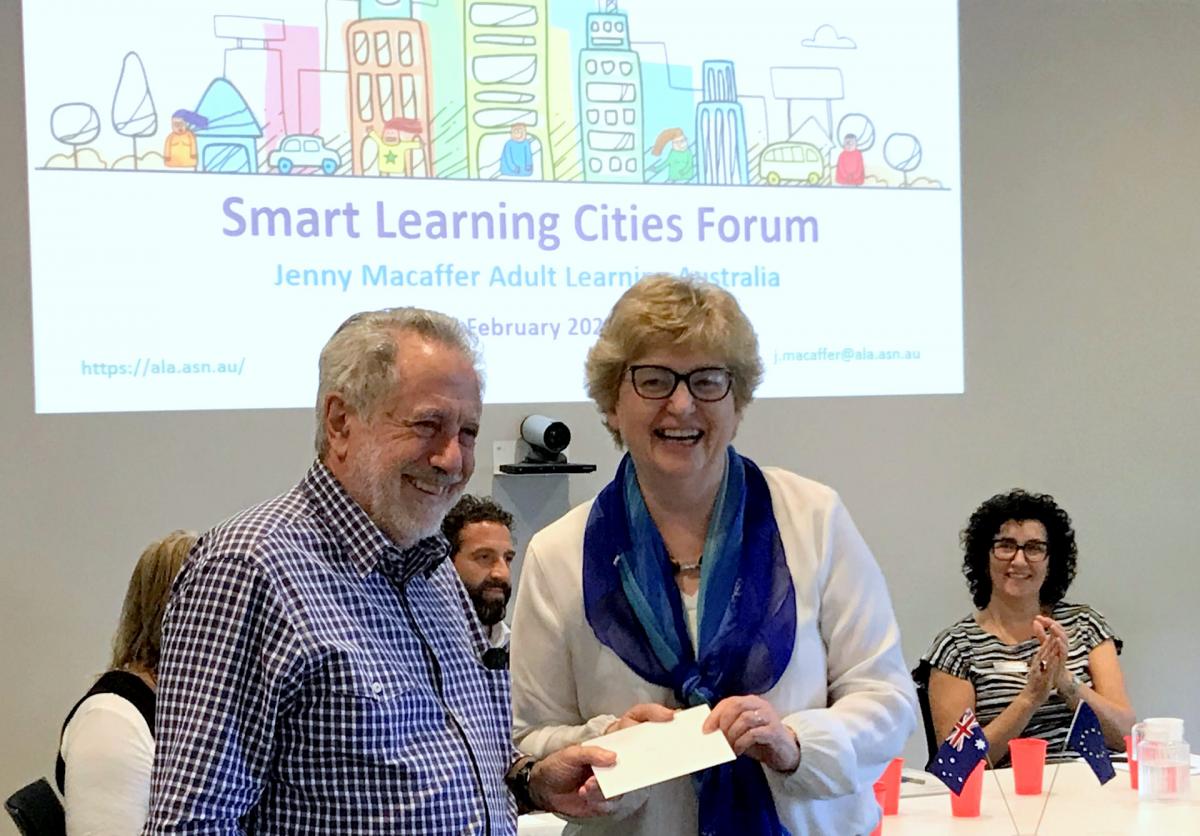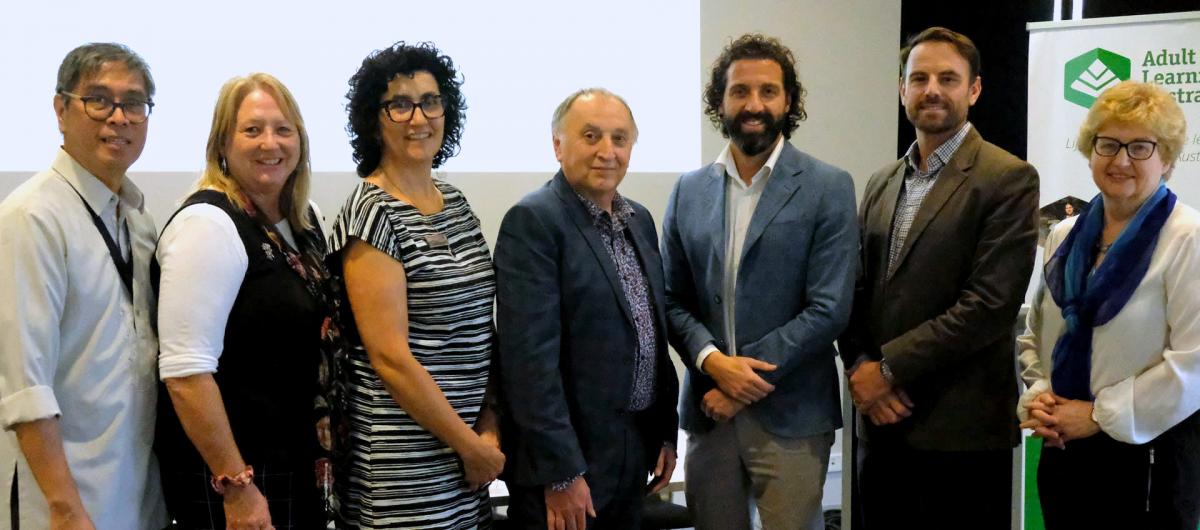Smart Learning Cities Forum - Melbourne, 26 Feb, 2020
To coincide with the visit of Professor Mike Osborne to the European Union Centre, RMIT University Melbourne, the Australian Learning Communities Network (ALCN), Adult Learning Australia (ALA), the European Union Centre, RMIT University, the City of Wyndham and the City of Melton collaborated on a Smart Learning Cities Forum. The idea was to examine the Smart City developments that are gaining momentum around the world and consider possible linkages with Learning City approaches.
[Click to enlarge] Left to Right: Associate Professor Robbie Guevara, RMIT University; Ms. Jenny Macaffer, CEO, ALA; Ms. Diane Tabbagh, Coordinator Learning Community, Libraries and Community Learning, Wyndham City Council; Professor Mike Osborne, University of Glasgow; Dr Adam Mowlam, Manager, Smart City Office, Wyndham City Council; Mr. Mathew Wilson, Manager Community Planning, Melton City Council; Dr. Leone Wheeler, Hon. Chair, ALCN
Professor Osborne set the scene with a keynote entitled Are Smart Cities Learning? His presentation was based on a background paper completed for UNESCO’s Fourth International Conference on Learning Cities held in Medellín, Columbia, 1-3 October 2019 to be published shortly. First, a summary of the key concepts that underpinned current Learning Cities. For example, the UNESCO definition of learning cities; equity; the importance of inclusion of indigenous knowledge; individualism vs collectivism; structural and functional diversity of learning systems (for example, adequate transport is a barrier to learning); lifelong and lifewide learning; the inclusion of civil society, and the idea of the co-construction of knowledge. We were reminded that only 41 countries have a national policy framework around lifelong learning with South Korea as an exemplary example.
Many Smart City developments have been largely tech-driven where education and learning seem to be missing from strategies. The Smart City approach might be seen as an opportunity for a city to gain further resources and rebrand itself. Professor Osborne challenged this idea. How do you shape Smart City developments? How do you get citizens to input and create change? How does the Smart City help citizens cope with strategies that are put in place? The implication is to focus on engaging citizens. Promote mutual exchange and the co-construction of knowledge. Learn about the quadruple helix, that is the collaboration of Higher Education; innovative companies; knowledge institutions and the public. Give citizens access to big data and other opportunities, for example, citizen science. Of course, there are different version of Smart City - version 1.0 to 3.0 where version 1.0 is city-led, and version 3.0 is citizen-led. Amsterdam is an example of 3.0.
Panel discussion
Panel members in replying to Professor Osborne’s keynote providing their own take on Smart Learning Cities and really challenged our thinking on Smart Cities.
City of Wyndham
The team from the City of Wyndham (Ms Diane Tabbagh and Dr Adam Mowlam) provided a snapshot of the location of the city (on the western edge of Melbourne) and demographics. Some interesting statistics included that Wyndham is the 3rd fastest growing municipality in Australia (population: 272,274); Millennials and younger generations dominate the Wyndham population (58% residents are 35 years or younger); the Wyndham Aboriginal and Torres Strait Islander population is the largest in all of Greater Melbourne with almost half of all Wyndham residents were born overseas from 162 different countries. Similar to the City of Melton the majority of residents who are employed tend to travel outside the municipality for work, and residents have a lower level of tertiary education and higher unemployment levels than Greater Melbourne. Diane pointed us to the latest Wyndham Learning Community Strategy where the theme of lifelong learning is utilised as the guiding principle driving social, economic, environmental and cultural life. Diane noted that Action plan was implemented in collaboration with key stakeholders including the Smart City Office. Examples of technical themes included in the strategy are jobs of the future, and utilising data and analytics to enhance service development and direct service delivery. Wyndham also became a member of UNESCO’s Global Network of Learning Cities in 2019.
Adam presented on Wyndham’s Smart City Strategy which won a prestigious Smart Cities Council Australia New Zealand 2019 Smart City Strategy award. Technology, innovation and data are providing new and useful tools for councils, and creating greater opportunities for residents, businesses and other organisations in the city to actively participate in implementing the changes that are taking place. However, each city has to define its own reason for being a Smart City. Citizens were consulted in the development of Wyndham’s strategy. A sample of citizens (800) provided feedback that they want to be more involved in public services decision making; they are generally optimistic about future skills; however, many citizens were held back by poor digital infrastructure. The city has many projects underway including larger roles out of smart parking; AI-based sports management, and GIS upgrade and the promotion of the city as a learning and research destination. Two of the wicked problems they are focussing on are waste management and transport! In summary, leveraging data and sharing knowledge is key to creating a smart, and a learning city.
City of Melton
Ms. Sally Edwards, Coordinator Community Activation and Learning at Melton City Council, who was not able to attend the presentation, sent a background note that the municipality is recognised nationally and internationally as a leader in the learning community landscape. Melton was the first local government in Australia to formally adopt a Community Learning Plan in 1998, the first to establish a joint Council and community group to guide the development of lifelong learning, the first to implement a governance body, the first City in Australia to become a Learning City member of the UNESCO Global Network of Learning Cities and to receive a prestigious Learning City Award. It is currently a joint theme leader for the Equity & Inclusion theme as part of UNESCO’s Global Network of Learning Cities new strategy. Sally notes to be both a Smart City and a Learning City you need to be able to engage with all groups, including those who are traditionally digitally excluded. Melton’s programs focus on digital inclusion and empowerment and any tools we develop will be shared with our cluster to enable a broader impact. Refer to Melton a Learning City: Community Learning Plan 2015-2018.
Mr. Mathew Wilson, Manager of Community Planning, City of Melton, based his presentation against a background of having recently attended UNESCO’s Fourth International Learning Cities Conference, in Medellín, Columbia. Mathew wrestles with the idea of the availability of tech and data without a focus on how we can use the capability to do something good. What are the ethical implications? Being smart is not a capability, rather it is an attitude to technology. Ethics and Privacy of Smart Cities have to be considered particularly regarding public content; ownership of infrastructure in public space; data ownership; storage and use, and the on-selling of data. It is important to understand your humanity and the humanity of others. What is the greater good? Mathew illustrated using an example from the city of Medellín. Under the theme of social inclusion, there was a need for safe public transport and access to education. The solution was giant outdoor escalators that transformed Columbian neighbourhoods (see https://edition.cnn.com/travel/article/colombia-medellin-neighborhood/index.html). This was the application of technology in a smart way. The escalator provided safe access to education. Access drives inclusion and participation. Social inclusion is SMART. Technology provides the capability to solve a problem and enhance the way we live as humans.
Adult Learning Australia
Ms. Jenny Macaffer, CEO of Adult Learning Australia (ALA), challenged us to take a broader view when thinking about the Smart City. There is another school of thought. What about low tech cities? Life is not just about the mechanical and the technical. What about creativity? How can we harness nature? How can we learn together and grow? How can the re-wilding of our cities help us to be smarter? With new opportunities comes rights and responsibilities. With growing workforce changes such as Artificial Intelligence (AI) we must respect and think about consequences for Human Rights. Cities in Australia are part of a democratic process. Think about ethics, local context, indigenous knowledge base, learning and sharing. Literacy is also a critical issue. How can citizens participate in the digital world of the Smart City if 44% of Australian adults lack the literacy skills required for everyday life? Don’t forget about the digital divide. The people who would benefit most are of great risk of being left behind. She concluded by saying that while old systems and structures may no longer be operating efficiently, we don’t need Smart Learning Cities, rather Smart Learning Cities need us to: uphold the common good; protect truth; provide nature-based solutions for both economic activities and social well- being. There is a national responsibility for the Federal Government to ensure there are resources so that everything can be connected.
Jenny reminded us that Adult Learning Australia is 60 years old this year and continues to campaign for a lifelong learning policy for Australia.
Conclusion
 The biggest challenge at the forum was that we did not have time to discuss all the ideas, and we came up with more questions than answers so there will be a need for follow up. All presentations will be uploaded on the ALA website and we will send out a notification when this happens.
The biggest challenge at the forum was that we did not have time to discuss all the ideas, and we came up with more questions than answers so there will be a need for follow up. All presentations will be uploaded on the ALA website and we will send out a notification when this happens.
The seminar ended with an acknowledgement of the work of Jim Saleeba who, since 2001 has worked tirelessly as Honorary Chair of the ALCN. I am taking over from Jim and I hope I am looking forward to bringing PASCAL more stories about what is happening within learning community partnerships in Australia.
- PASCAL Activities:
- PASCAL Themes:
 Printer-friendly version
Printer-friendly version- Login to post comments




Comments
Continuing Engagement
To paraphrase something George Melly once said of his portrait on a record cover, "wouldn't this look good framed". I can hardly believe that this event was only last Wednesday, and here I am back on the other side of the world. It was a very fruitful event, and we are hoping for continuing engagement with both Wyndham and Melton, who are great examples of cities that are committed to learning.